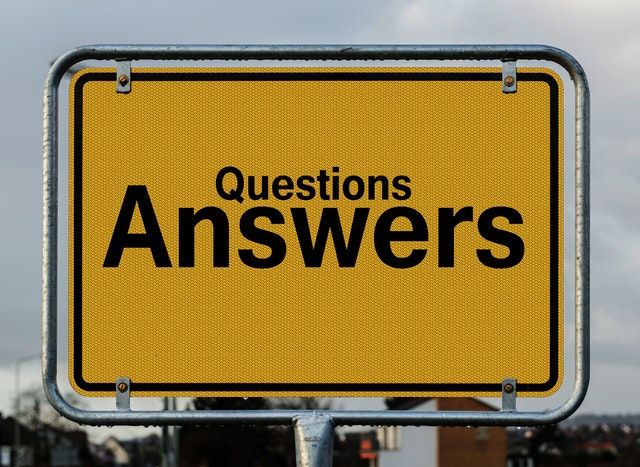How to Deal with Complexity Like a Pilot (Part 2)
Slow is Smooth. Smooth is Fast.

Employers aren't really asking about your greatest weakness
(Only takes 5 minutes to read.)

Masks are coming off. People are eating out. Things—at least in the U.S.—are returning to “normal.”
Except…
What if normal means long commutes, small cubicles, and colleagues who talk way too much and way too loud?

That’s right — it’s also time to find a new job.
That means interviews… maybe a lot of them… and THAT means you are likely to encounter… the Jesus question.

While the Jesus question can have several forms, the most common one is this:
What is your greatest weakness?
The Jesus question, you see, has nothing to do with believing in Jesus. The question is designed to determine if you think you ARE Jesus.

👉 Pro tip 1: You are not Jesus (even if your name happens to be Jesus.)
With a bit of planning, this type of question can be the easiest one in the whole interview. First, you know that it’s coming. Second, it’s often one of the last questions asked, meaning you’ve already had an opportunity to set up your response by tracing your education, experience, and career path. Third, there is a right answer, and executed correctly, it can be a great finish.
Yet, applicants—even experienced managers—frequently crash and burn on this question. That’s why employers ask it!
Having conducted and helped people prepare for many, many interviews, we are consistently surprised how often applicants approach this question with the wrong strategy.
So study up!

The first trick is to realize that, “What is your greatest weakness?” is NOT actually asking about your greatest weakness. It’s not an honesty test (or a government polygraph) either. It’s about self-awareness.
🔥 Amateur strategy 1: “I have no great weaknesses.” (Variant form: “I have a well rounded skill set.”)
Congratulations! You’ve just proclaimed that you are, in fact, Jesus! Except, Jesus—being much, much smarter than you—would not answer the question that way.
👉 Pro tip 2: Remember pro tip 1: You are not Jesus.
It is amazing that applicants approach the interview with this plan. The thinking seems to be: “if I tell them my actual weaknesses, they won’t hire me.” That might be true; however, everyone has weaknesses. Are you aware of what they are?
If you answer, “no,” then you just failed.
A shocking number of people—and particularly more senior managers—will claim they have no weaknesses.
Unfortunately there are no openings for arrogant jerks at this company… NEXT!
🔥 Amateur strategy 2: “I work TOO HARD! I am a WORKAHOLIC!” (variant form: “I care too much!”)
That could be true, but you still failed the test. Most likely you are lying and providing a false weakness. Even if you are not lying, you may not be the type of person people want to have around.
🔥 Amateur strategy 3: “I am terrible at baking cookies.”
Unless you are interviewing at a pastry shop, you’ve just provided an irrelevant weakness. Still a fail, but better than proclaiming you are without sin or obviously lying.
What’s the pro solution?

🏆Provide a relevant—but still minor—weakness + compensation strategy + evidence that the compensation strategy works.
This answer shows self-awareness, a willingness to embrace change, and an indication that the weakness will not impact your ability to do your job.
Of course, you have to pick the right weakness, and not one that causes the interviewer to stop listening. Here are some wrong answers:
— I have a tendency to micromanage…
— I am not good with numbers…
— I am impatient…
— I drive my teams too hard…
— I am often late…
— I sometimes forget to shower (mathematicians and computer programmers — you know who you are!)
Here are some potentially good answers (and the specific job is key—a potential weakness in one role may or may not matter for a different role):
— I used to have a fear of public speaking; however, I joined toastmasters and gained a lot of experience. So while I still don’t enjoy speaking in groups, I’m confident I can do it when needed.
— I’m used to working with highly motivated teams, so I’ve found dealing with unmotivated employees to be difficult in those rare cases. In the past I’ve tried to work with these employees to understand how to help them achieve success. In cases where this has failed, I’m quicker now to remove them, because I’ve seen the damage low performers can cause in high performing teams.
— Relevant to this role, I have a lot of experience in industry X, but not in industry Y. So, before applying to this job, I contacted a number of experts in industry Y to understand some of the challenges and opportunities. In addition, I read <book>, studied the web sites of the competition, and attended <class or online seminar> to build my professional network in this area.
“My company doesn’t ask questions like this.”
What if you have prepared a brilliant answer, you get to the interview, and… they don’t ask the question?
Well, that’s perfectly fine. If you have a really good answer planned out, you use it anyway.
Example: “When I interviewed candidates for jobs, I always thought about how the candidate’s skill sets complimented or compensated for the strengths and weaknesses of the team. So, I wanted to tell you about…” (and here you can lead with your strengths!)
Or, to use the famous Robert McNamara quote: “Never answer the question that is asked of you. Answer the question that you wish had been asked of you.”
Get out of that cubicle, go get that job, and have faith that a strong answer to the Jesus question may just save your interview.
Don't forget to
Subscribe
and Share this article using the links below.
Email •
Twitter •
LinkedIn •
Hacker News •
Reddit
Copyright © 2021 Franklin Faraday Group LLC. All rights reserved.